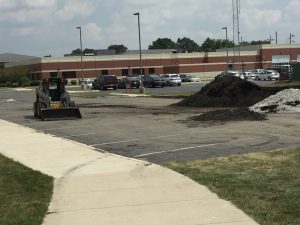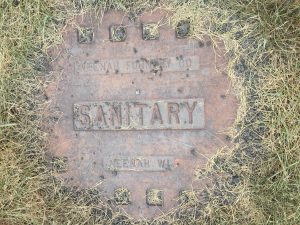Residents complain of bad odors in Lyons
By Jean Lotus Staff reporter — August 15, 2016
Black clumps of biosolid fertilizer are spread in the grass at parks and playgrounds in Lyons. (Chronicle Media)
There’s something in the air in the Village of Lyons and it’s not the sweet smells of summer.
Village residents have complained that the parks and school playgrounds smell terrible after the village applied “biosolid” landscaping fertilizer obtained from the Metropolitan Water Reclamation District as part of a pilot program.
Biosolid fertilizer is composed of composted and sterilized byproducts of human sewer sludge, according to the MWRD website.
For the past several years, the village has been participating in the MWRD program and using the fertilizer on grass and playing fields at Veterans and Smith parks. This year, village employees also spread the fertilizer on every school playground in Lyons Elementary District 103, including Lincoln School in Brookfield.
More than two weeks after the application, residents are still complaining about the odors.
“My dog is refusing to walk in the park anymore,” said Jennifer Lewis. “He tries to drag me out of it.” Lewis lives close to Smith Park. “If you open a door or open a window, the smell just slaps you upside the head.”
“It literally smells like a stable,” said resident Kevin Gleeson.

Black clumps of biosolid fertilizer are spread in the grass at parks and playgrounds in Lyons. (Chronicle Media)
His son’s football practices were cut short last week, he said. “The coach was holding his nose and these kids are doing jumping jacks and running laps. They just left early and got the heck out of there. That’s what we’re dealing with.”
Biosolids are created in wastewater treatment when organic matter from sewer sludge undergoes chemical and physical change by being heated at more than 95 degrees and broken down in “digesters” by microorganisms for 50 days, then aged in tanks for 18 months, according to the MWRD information website. Biosolids look like fine composted dirt and are rich in nitrogen and phosphorus.
The village has used the biosolids for several years, but this year, a month-long delay in spreading the fertilizer after delivery may have contributed to the pungency.
The MWRD delivers 22 cubic yards of biosolids at a time to local municipalites in a 24-cubic yard semi trailer. This material was dumped behind the Lyons police station in the 4200 block of Lawndale Avenue sometime between June 13 and 14, according to MWRD spokesperson Allison Fore.
The MWRD recommends applying the fertilizer immediately.
“The delivery of biosolids should be scheduled so that the biosolids are spread as soon as they are delivered to minimize the duration of stockpiling,” the MWRD fact-sheet says.
But Lyons did not begin to spread the fertilizer until the last week in July, allowing the pile to sit. According to MWRD’s Fore, the village also mixed the fertilizer with soil. Village Administrator Thomas Sheahan said this was because it rained on delivery day and his department does not have a large staff. Sheahan said he believed the program was valuable and saved the village and schools money on landscaping.
Now some people are worried that the strong sewer smell might be a health risk.
Melissa Ferns said her children developed “red pinpoint bumps all over their bodies” after coming home from playing on both parks last week. “It took a day for it to fully clear up. After [the children] took a bath it started going away,” Ferns said. “It’s been happening every day they play outside there and it never was a problem before,” she said. She said the parks “smelled like a zoo” after village employees applied the fertilizer. “I was gagging walking to my car, the smell was so strong.”
Resident Bill Ruting, who identified himself as a former hazardous material specialist said the odor was evident just from driving past.
“It’s as obnoxious as hell, I wouldn’t want my kids playing in it without knowing what it is.”
University of Illinois microbiologist Roderick Ian Mackie helps commercial pork farms in Illinois deal with odors caused by anaerobic bacteria in the breakdown of animal waste. He said a “fecal smell” is a signal that manure waste may not have been “stabilized” to get rid of anaerobic reactions.
“I wish it would just have a torrential downpour,” said Jennifer Lewis. But Mackie warned the odors are actually weaker in dry weather. “It smells much worse when it rains,” he said.
John Colletti of Region 5 of the US Environmental Protection Agency said MWRD’s program met the federal requirements to remove pollutants (metals) and reduce pathogens and the attraction to vermin. Biosolids are safe, he said.
“[MWRD applies biosolids] on parks and ball fields all over the Chicago area with kids playing on the fields the same day and have not had issues. “
Colletti said it was possible “mixing the fertilizer with topsoil and then storage after a rain caused the odor problems.”
Colletti said the MWRD had offered to remove the fertilizer pile behind the village municipal building and replace it, but the village declined. The MWRD may assist in the spreading of the materials in the future and advised the village to rake up larger clumps.
Meanwhile, school started for Lyons District 103 children on Aug. 15 and playgrounds still have a strong sewer odor. Summer school students were kept inside during recess because of the smell, and it remains to be seen if students will be allowed to play outside.
Free digital subscription to the Cook County Chronicle
Read the current issue of the Cook County Chronicle
— Residents complain of bad odors in Lyons —








